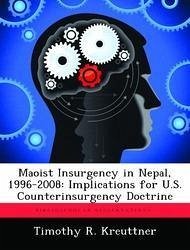The purpose of this monograph is to show that US counterinsurgency doctrine would benefit from greater emphasis on social, cultural, and political aspects of the operating environment, using the case of the Maoist insurgency in Nepal as an example. The concept of fourth generation warfare provides context with its focus on the application of political, economic, and social networks in modern conflict. In approximately 12 years, from 1996 to 2008, the Communist Party of Nepal (Maoist), or CPN(M), waged an insurgency against the Nepalese government and gained majority rule through free elections. The Maoists, following Mao Zedong's theory of people's war, achieved a military stalemate against the Nepalese Army and negotiated a political settlement with the parliamentary parties that effectively ended the monarchy and resulted in a major electoral victory. Despite training and material support from the US, UK, and India, the Nepalese Army was unable to prevail in its counterinsurgency campaign. The Nepalese government failed to wage a coherent strategy to address the root social and economic causes of the conflict. The government relied on military and law enforcement to solve a problem that was rooted in social and political tensions. Power struggles between the monarchy and the parliament as well as among the political parties undermined the legitimacy of the Nepalese government and allowed the Maoists to win the support of the populace. The CPN(M) won the most seats in the April 2008 elections and took control of a coalition government, with the former Maoist leader, Pushpa Kamal Dahal, as Prime Minister. The new government faces challenges in integrating former combatants with the Nepalese Army and in satisfying former insurgent allies who still have unfulfilled agendas. The implications of the Maoist insurgency in Nepal for US counter-insurgency doctrine pertain to emphasis on certain ideas rather than requiring anything new. The primary lesson of the conflict is
Hinweis: Dieser Artikel kann nur an eine deutsche Lieferadresse ausgeliefert werden.
Hinweis: Dieser Artikel kann nur an eine deutsche Lieferadresse ausgeliefert werden.








